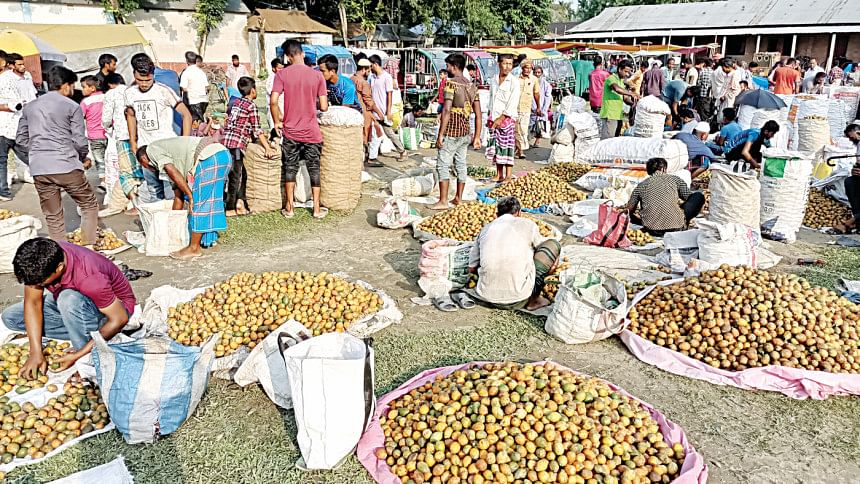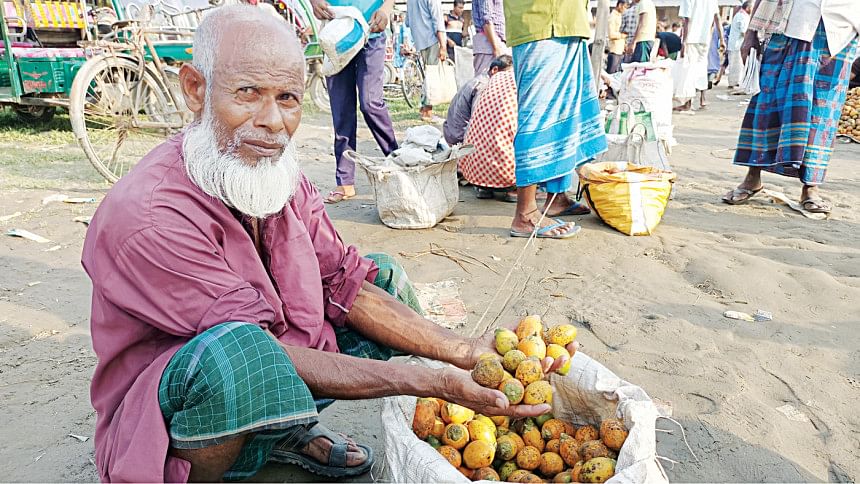Betel nut providing added benefit to farmers

Betel nut, also called the areca nut, has become a great source of additional income for farmers in Bangladesh as the fruit native to South Asia and parts of east Africa is widely consumed in the country.
Farmers previously grew the fruit solely to satiate their personal needs but now, there are about 53 lakh betel nut trees across five districts of greater Rangpur, namely Lalmonirhat, Rangpur, Kurigram, Gaibandha and Nilphamari.
Raised around their homesteads, farmers can get up to 800 betel nuts from a single tree each year, according to data from the Department of Agricultural Extension (DAE).
The fruits are then sold in 80-piece bundles for between Tk 250 and Tk 400 depending on size and quality while input costs are minimal, providing farmers the benefit of an additional income.
Wrapped in betel nut leaves and other ingredients to make betel nut chewing, locally known as paan, betel nuts worth as much as Tk 650 crore are traded in the region each year during the harvesting period between April and June.
The fruit is also used as a raw material by dyeing factories.

At present, commercial betel nut farmers have 200 to 2,000 trees mostly on high and abandoned land.
Shah Alam, additional director of the Rangpur DAE, said betel nut trees provide yields within four months of planting, during which costs round up to about Tk 500 per tree.
Considering the ample returns, betel nut farming has increased four times compared to a decade ago.
Besides, the DAE encourages and advises farmers on cultivation, he added.
Laxmikanta Barman, a resident of Durakuti village in Lalmonirhat sadar upazila who is a school teacher by profession, said he can earn an additional income of Tk 1,500 to Tk 4,000 from each betel nut tree.
"I planted 120 betel nut trees on abandoned land around my homestead as well as another 300 alongside nearby roads and sell the fruit for more than Tk 2 lakh each year," he added.
Suresh Chandra Sen, a farmer of Sindurmati village of the same upazila, said he started commercially producing betel nut a decade ago.
Now he has 2,000 betel nut trees across his two-acre orchard in addition to the 200 surrounding his homestead, earning him more than Tk 3 lakh each year.
What makes betel nut cultivation particularly tantalising is that the trees can be grown even on land where other crops fail, said Zulfikar Ali, a farmer of the Baidyerbazar area in Rajarhat upazila of Kurigram.
He went on to say that betel nut cultivation has been gaining ground in recent years as the fruit is now being sold at higher prices.
Many betel nut traders even pay in advance for a supply during the harvesting period, he added.
Nur Islam, another farmer of the same village, said he previously used the money earned from his 30 betel nut trees to help cover family expenses.
"But seeing the past success, I have prepared to plant 200 more trees to make a commercial orchard," he added.
Zilhaj Mia, a betel nut trader of Rajarhat upazila, said he buys up to Tk 60 lakh worth of the fruit every year.
He has already bought betel nuts worth Tk 20 lakh so far this year.
"We often give the money in advance to farmers," Zilhaj said, adding that there are more than 500 betel nut traders in greater Rangpur.
Tufan Islam, a betel nut trader at Durakuti Haat in Lalmonirhat sadar upazila, said he buys betel nuts from farmers at local markets and sells them to various dye factories.
At present, traders are buying betel nuts for Tk 250 to Tk 400 per 80-piece bundle.
"Betel nuts worth about Tk 50-60 crore are sold in Durakuti Haat every year," he added.

 For all latest news, follow The Daily Star's Google News channel.
For all latest news, follow The Daily Star's Google News channel. 



Comments